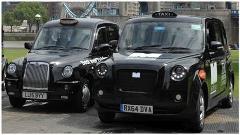


The London Taxi Company´s three-dimensional trademarks forming the exterior of their black cabs declared devoid of inherent distinctive character
In the recent and comprehensive decision from the Chancery Division of the High Court of Justice, England and Wales, Justice Arnold ruled that the Metrocab taxi is not infringing the London Taxi Company´s (LTC) three-dimensional United Kingdom Trademark (UKTM) and Community Trademark (CTM). On the contrary, the three-dimensional trademarks were found to be invalid as they both lack necessary distinctive character and consist exclusively of the shape which gives substantial value to the goods. The CTM was also found invalid due to non-use. (Case No: HC-2014-002085, Judgement of 20 January 2016)
LTC´s UKTM No. 2440659 LTC´s CMT No. 951871
Background of the case and subject matter The Claimant, the London Taxi Company, is the successor in title to the manufacturer of the Fairway, TX1, TXII and TX4 models of the London taxi. The Defendants, Frazer-Nash Research Ltd and Ecotive Ltd, are the successors in title to the manufacturer of the Beardmore, Oxford and Metrocab models of the London taxi. The LTC is the registered proprietor of the three-dimensional Community Trademark No. 951871 (CTM) for “motor vehicles, accessories for motor vehicles; parts and fittings for the aforesaid” in Class 12, and the United Kingdom Trademark No. 2440659 (UKTM) for “cars; cars, all being taxis” in Class 12. The representations of the UKTM also forms the subject-matter of LTC´s UK Registered Design No. 2069313, which was not relied upon by LTC in these proceedings. The LTC claimed that the shape of the Metrocab taxi is substantially copied from the shape of the TX4, and that the Defendant intends to deceive the public as to the origin of the new Metrocab taxi by adopting a shape which closely resembles that of the LTC´s models. The Defendants counterclaimed that the trademarks are invalidly registered because they lack distinctive character and add substantial value to the goods. In alternative, the Defendants contended that the CTM should be revoked for non-use. The Decision of the Chancery Division of the Hight Court of Justice In the comprehensive judgement of 299 paragraphs, Justice Arnold dismissed the claims for trademark infringement and passing off brought by LTC and accepted the counterclaims and defenses of the Defendants. In summary, Mr. Arnold came to the conclusion that both of LTC´s trademarks were devoid of inherent distinctive character in relation to goods in Class 12 at the respective dates of application, and that neither of the marks had acquired a distinctive character as a result of use by the date of the counterclaim. In the judge´s view, the disputed trademarks would simply be perceived by the average consumer of taxis as merely a variation of the typical shape of a taxi. Furthermore, regardless of the distinctiveness, the two trademarks were also declared invalid in respect of Class 12 because they exclusively consist of the shape. After a comparison of the shape of the Metrocab and the s
hapes of the LTC´s taxis, for which the trademarks were registered, Mr. Arnold came to the conclusion that there is no likelihood of confusion. Also, the Defendants were not found to take unfair advantage of the LTC´s reputation, as a reputation as such was not found. In addition, it was found that the CTM should be revoked for non-use in respect of goods in Class 12 with effect from 2 May 2014, as the only use of taxis of that mark consisted of sale of second-hand taxis or sales for scrap. Lastly, Justice Arnold concluded that the use of the Metrocab is in accordance with honest practices and that there is no evidence that the shape of the new Metrocab is likely to lead consumers of taxi services to believe that it comes from the same source as LTC´s taxis, as opposed to being a licensed London taxi. There has been no damage and the claim for passing off thus failed. Press here to read the full judgement.Related
- "Neuschwanstein" is not a trademark!
- 14 June 2013: Munich Patent Law Conference - Calculating Damages in Patent Infringement Cases
- 15 Top Brands - Interactive Brand Rating - Years 2000 - 2018
- 2014: Statistics for Community Trademarks
- 27 June 2014: Munich Patent Law Conference – Burden of Pleading and Proof in Patent Infringement Cases
- 3D-Trademark Protection for layout of Apple Stores
- 40th Anniversary of the European Patent Convention (EPC)
- A backpack shape as a 3D trademark – a BoA decision of the EUIPO
- A case of „Bounty“ hunting in Germany
- A new report on the economic impact of counterfeit trade published by OECD and EUIPO
